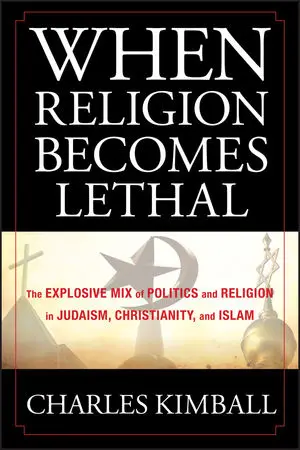The Grave Dangers of Merging Politics and Religion: A Fatal Threat to Pluralistic Societies
Introduction
Throughout the course of human civilization, societies have gradually recognized the necessity of separating religion from politics. The role of politics is to govern the state, maintain order, and safeguard citizens’ rights; religion, by contrast, is a matter of personal belief and spiritual pursuit. When the two remain separate, society can maintain pluralism and harmony. However, once religion is drawn into politics—especially when rulers use state power to enforce religious doctrines—pluralistic societies inevitably fall into division, hostility, and violence. This is not an abstract concern but a grim reality repeatedly proven by history.
1. Suppression of Religious Freedom and Group Oppression
When religion becomes the foundation of state governance, rulers often elevate one faith as the “state religion” and use it as the benchmark for loyalty and legitimacy. In medieval Europe, for example, the Catholic Church allied with monarchs not only to suppress Protestant believers but also to persecute “heretics” through the Inquisition, depriving countless people of their lives and freedom. When freedom of belief is destroyed, minority religious groups are condemned to marginalization and persecution, leading to deep and lasting social rifts.
2. Escalation of Ethnic and Religious Conflicts
In pluralistic societies, diverse groups and faiths must coexist under the principles of equality and the rule of law. Once politics aligns itself with a single religion, social tensions escalate sharply.
-
The Thirty Years’ War (1618–1648): Triggered by Catholic-Protestant conflicts, it left millions dead in the German states and became one of Europe’s bloodiest religious wars.
-
Theocratic regimes in parts of the Middle East: Sectarian divides (e.g., between Sunnis and Shiites), amplified by state power, have fueled decades of civil wars and terrorism.
-
Religious conflicts in India: The rise of Hindu nationalism in politics has fueled recurrent violence between Hindus and Muslims, severely undermining social stability.
These cases demonstrate clearly that the merger of politics and religion leads not to unity but to confrontation, bloodshed, and chaos.
3. Destruction of Democracy and the Rise of Authoritarian Rule
When rulers wield power in the name of religion, their authority is cloaked in “sacred legitimacy,” silencing dissent.
-
In the Islamic Republic of Iran, the Supreme Leader is both the ultimate religious authority and the head of state, where political dissent is often condemned as betrayal of God.
-
In medieval theocracies, monarchs invoked the “divine right of kings” to avoid accountability, ultimately fostering authoritarian rule.
Once religion is politicized, democracy, judicial independence, and freedom of speech collapse, plunging the nation into the tyranny of theocracy.
4. Obstruction of Social Development and the Collapse of Civilization
When politics is hijacked by religion, science, education, and culture suffer.
-
The Galileo affair is a stark example, where the Catholic Church, citing heresy, silenced scientific truth and delayed human progress.
-
In some modern theocracies, education is subordinated to rigid religious dogma, depriving students of access to science and free thought, leaving society stagnant and backward.
A society dominated by religious extremism inevitably becomes a barren land where free thought and innovation wither.
Severe Warning
History, written in blood and fire, has proven again and again that the union of politics and religion is the seed of disaster.
It:
-
Suppresses religious freedom and creates oppression;
-
Fuels ethnic and sectarian strife, igniting violent conflict;
-
Destroys democratic institutions and breeds authoritarianism;
-
Blocks civilization’s progress and annihilates the future of humanity.
For any nation of diverse ethnicities and faiths, the principle of separation of church and state is non-negotiable. Ignoring it means that today’s peace and prosperity will quickly degenerate into tomorrow’s hatred, war, and regression.
This is the harshest warning to all pluralistic societies:
Once politics hijacks religion, destruction is inevitable.
Appendix: Selected Quotations on the Dangers of Mixing Politics and Religion
1. James Madison (Fourth President of the United States, “Father of the Constitution”)
“The purpose of separation of church and state is to keep forever from these shores the ceaseless strife that has soaked the soil of Europe in blood for centuries.”
Explanation: Madison emphasized that the principle of church-state separation was designed to prevent the religious wars and bloodshed that devastated Europe from repeating in America.
2. Thomas Jefferson (Principal author of the U.S. Declaration of Independence)
“History, I believe, furnishes no example of a priest-ridden people maintaining a free civil government.”
Explanation: Jefferson warned that societies controlled by religious authorities cannot sustain true freedom or democratic governance.
3. Voltaire (French Enlightenment thinker)
“Those who can make you believe absurdities can make you commit atrocities.”
Explanation: Voltaire underscored the danger of blind religious obedience, noting how manipulation of belief can lead to violent and destructive acts.
4. Martin Luther (Leader of the Protestant Reformation)
“The kingdom of God is to be governed not by laws of men, but by the Word of God. The kingdom of the world is governed by human laws. The two must not be confused.”
Explanation: Luther distinguished between spiritual authority and worldly governance, warning against conflating the two.
5. John Locke (English philosopher, founder of liberalism)
“The care of souls is not committed to the civil magistrate, any more than to other men.”
Explanation: Locke argued that matters of personal faith and conscience lie outside the jurisdiction of governments, forming a foundation for modern religious freedom.
6. George Santayana (Philosopher)
“Those who cannot remember the past are condemned to repeat it.”
Explanation: Santayana reminded future generations that forgetting the lessons of history—especially the bloody consequences of merging religion with politics—will only lead to their repetition.

